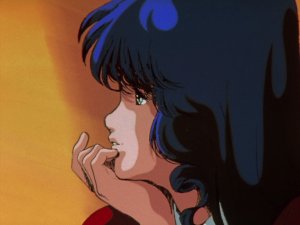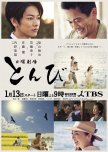"Tobi (tonbi) ga taka wo umu," translates literally as "a kite begetting a hawk." This Japanese expression is where the drama title originates, and such imagery is deeply ingrained in the story. But what do these words refer to ultimately? In simpler terms, "even common parents can give birth to an amazing child." This exactly what Tonbi approaches with the Sato Takeru character, but it is as much the story of the "kite," as the hawk. And if we apply the expression once more, even a simple story may give rise to a fine drama. Here, it does.
Viewers fresh from home or even on the cusp of building their own families may relate most to the tale dictated by Tonbi. The same might be said for those who, already having experienced much of life, are adjusting to empty nests. This drama builds an effectively nostalgic hometown backdrop, complete with unique landmarks and quirky, over-exaggerated denizens. With such a setting, themes and happenings are explored which remain universal despite whichever specific focus is placed on them. The result is a warm, emotional ride which is rather easy to connect with.
Several aspects struck me as slightly uneven nonetheless. The plot relies on various coincidences and, while I can allow for the fact that life sometimes hands out beautiful symmetry, there are too many to shrug. Many point out that Japan stumbles often with romantic love. As expected, few romantic relationships in Tonbi (including one which later becomes a major plot point) felt honestly loving. Because the true focus centers on bonds between parent and child, this is relatively forgivable. Lastly, much of the story is told by son Akira, either through flashbacks or as stories told to others. For the most part this works just fine, but these sequences frequently show characters from their own perspective. While it would be nice to have that level of insight in real life, this staggers somewhat strange. Even for a community of people as open as these, we rarely know everything others experience alone (especially our parents).
Near the start of Tonbi, I spent a reasonable amount of time deciding whether Uchino Masaaki was performing well. His Yasuo is larger than life, initially more like a dumb but lovable hound unable to control itself when excited than an actual person. Yet when all parts of his portrayal are placed together, brilliance flows forth. My favorite bits were his emotional revelations, becoming acquainted with the vulnerability and loneliness of the character. Sato Takeru improves every time I encounter him. His scenes often feel quite natural lately. While his Akira does not induce the same level of interest as Yasuo, the chemistry with Uchino-san makes this drama. A true degree of familial love seems to pass between them, whether they are sharing warm moments or standing in conflict.
Instrumental pieces in Tonbi are light and subtle. There are various gentle themes which play at pivotal moments, particularly those when a character is reminiscing or about to experience change. Overall suitable, the tender and unobtrusive way they are presented is simply wonderful. Fukuyama Masaharu provides the gorgeous theme ("Tanjobi ni wa Mashiro na Yuri wo"), with a voice that croons nostalgia with every syllable. Whenever it played during the final moments of an episode, my heart swelled.
Cet avis était-il utile?
























Commentaires